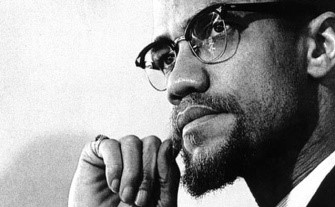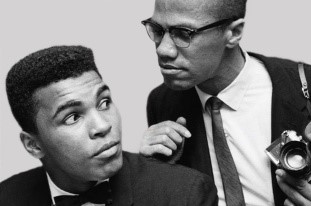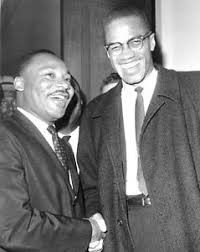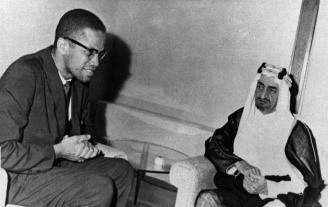



El-Hajj Malik Shabazz, Malcolm X, is one of the most iconic figures of the 20th century and arguably the most influential Muslim born on American soil. His body of work continues to resonant with millions of people worldwide, both Muslims and non-Muslims. The number of African Americans who were influenced to explore and embrace Islam because of Malcolm’s example is countless.
- Description
Malcolm Little was born to activist parents, Earl and Louise Little. The couple met in Toronto, Canada where they were active in race matters. Both were active and held leadership positions in various chapters of Marcus Garvey’s Universal Negro Improvement Association. As a child, young Malcolm often traveled with his father to UNIA meetings where he would hear his father expound on Garvey’s philosophy of pride in one’s African heritage, economic, social self-sufficiency for Black people, and Africa for the Africans. After a series of traumatic childhood experiences, including the murder of his father by racist Whites in Omaha, NB and the institutionalization of his mother, Malcolm moved to Boston to live with his sister, Ella Collins. Malcolm’s stay in Boston and New York resulted in his getting involved in street hustles and burglary rings that eventually landed him in prison for eight years. While in prison, Malcolm accepted the heterodox teachings of Elijah Muhammad and the Nation of Islam. Malcolm was released from prison and moved to Detroit to live with his brother who was also a member of the Nation. Malcolm was such an energetic articulate recruiter for the organization that he was soon elevated to the position of National Spokesman for Elijah Muhammad and National Minister for the group. He was responsible for the explosive growth of the organization tirelessly traveling across the country opening temples and recruiting new members. His rapid rise in the Nation caused jealousy among the group members, particularly members of Elijah Muhammad’s family. Malcolm was silenced by Elijah Muhammad in November 1963 for making comments, against Elijah’s instructions, about the assassination of President John Kennedy.
On March 8, 1964, Malcolm announced in a press conference that he was no longer a member of the Nation of Islam and that he was forming another organization, Muslim Mosque, Inc. In April 1964, Malcolm left to perform Hajj. He was a guest of then-Prince Faisal. Malcolm traveled throughout the Middle East and Africa where he met with heads of state and leaders of liberation movements before returning to the United States. When he returned to the US in June 1964, he announced the formation of Organization of Afro-American Unity, named after the Organization of African Unity. While the Muslim Mosque, Inc. was exclusively for Muslims, the OAAU was open to people of all faiths or no faith. During the 11-months from the time he left the Nation and his martyrdom on February 21, 1965, Malcolm illuminated the path for millions to embrace Islam. Malcolm was evolving politically and religiously at a rapid pace before his assassination. He was granted ijaza by Shaykhs in Saudi Arabia to give Dawah in the United States. Al-Azhar University in Cairo gave Malcolm 20 scholarships for African Americans to study there. Malik Shabazz is a transcendent figure that the American Muslim community has just started to understand and appreciate his significance as an American Islamic Movement visionary.
- Contributions/Successes
Some of Malcolm’s greatest contributions were his incomparable attributes of sincerity to his beliefs, truth telling, even to tyrants, loyalty, and single mindedness to Islamic movement in all its manifestations. Malcolm was gifted with the understanding that Islam is an organic whole that consists of adherence to guidance in all aspects of human endeavor and not just acts of ibadah. Malcolm’s uncompromising stands for Truth hearken back to the first generation of Muslims who preferred martyrdom than a life living on their knees.
Malcolm’s example provided generations of young people, including Muslim youth, a counter narrative to the social change modality of “peace at all costs,” and “going along to get along.”
Malcolm’s life demonstrated that there can be no peace in the absence of justice and that justice comes from righteous struggle.
- Failures
If we view Malcolm’s life resume only from his 11-months of practicing Islam as outlined in the Qur’an and Sunnah of Prophet Muhammad ibn Abdullah (saallahu alaihi wassalaam) there is very little that can be characterized as a failure. He was offered sanctuary and jobs in Ghana and other African nations if he decided not to return to live in the United States. But, Malcolm’s commitment to spreading True Islam in America and the liberation of Black people in this country was so great that he refused to try to secure his personal safety at the expense of his fulfilling the mission that he was charged with by Allah Subhana-wa-Ta’la.
- Lessons
Muslim entities must take public stances and make decisions that are true to the Islamic methodology of Prophet Muhammad (Saallahu alaihi wassalaam) and not mere positions of convenience and thus devoid of struggle or difficulties. This may be the most impactful lesson to be gleaned from the life of El- Hajj Malik Shabazz, Malcolm X.
(Article contributed by Imam Khalid Griggs)
